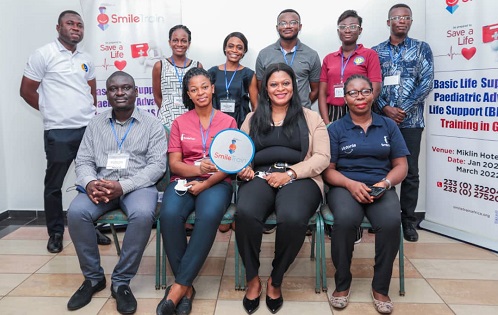
Thirty medical professionals have been offered special training to provide free cleft surgery and other forms of essential cleft care in the country, under the auspices of Smile Train, a global charity into cleft surgery.
The medical professionals, selected from Komfo Anokye Teaching Hospital (KATH) and Korle Bu Teaching Hospital, in batches of six, were offered a range of clinical training in surgery, anesthesia, nursing, and other comprehensive cleft care.
The last batch, made up of pediatricians and anaesthetists, were taken through Basic Life Suport/Pediatric Advanced Life Suport (BLS/PALS) for children.
Smile Train is the largest cleft-focused organisation providing training, funding, and resources to empower local medical professionals in 70 countries, including Ghana, to provide free cleft surgery and other forms of essential cleft care in their communities.
Speaking at the opening of the training, Mrs Nkeiruka Obi, African Representative of Smile Train, said that the organisation would continue to ensure that surgeons and trainees around the globe had access to the most advanced, effective cleft surgery training tools available in this modern time.
She noted that in low-resource settings, access to safe, high-quality surgical training could be a challenge, particularly when it comes to training for specialised procedures like cleft lip and palate surgery.
Dr Anastasia Ohene, anesthetist at KATH and an instructor with Smile Train, who facilitated the training, indicated that after cleft lip or cleft palate surgery, there could be speech difficulties-hypernasality and articulation difficulties.
She, therefore, stressed the need for an interdisciplinary approach in the comprehensive management of individuals with cleft lip and or palate, after the surgery, hence the training.
According to Dr Ohene, Smile Train’s focus was not only on cleft surgery but also ensures the abnormal nasal resonance, abnormal nasal airflow, altered laryngeal (vocal chord) voice quality were all corrected for the children to live an enjoyable life.
Speech specialist, she said, should be involved in identifying those infants who were at risk of communication disorders, and also for initiating early intervention to prevent or mitigate communication disorders caused by the cleft.
A participant, Dr Charles Martyn-Dickens, a paediatrician at KATH, was full of praise for Smile Train for organising the training, saying it would build up their skills to provide comprehensive care after cleft repair, as some children exhibited “cleft palate speech” because the nasal airflow could be tempered with during surgery.
He said the training would empower them to be able to resuscitate any child with challenges of breathing.
“Anywhere I find myself, be it at the mall, market, school, I will be able to render my service to any child having difficulty breathing, thanks to the skills acquired from the training,” he emphasised.
FROM KINGSLEY E.HOPE, KUMASI






